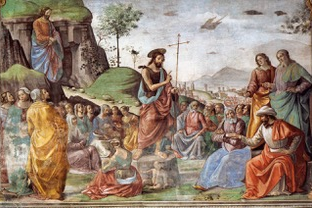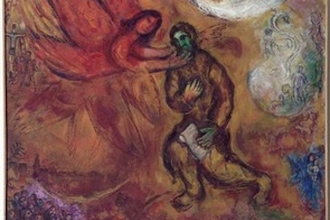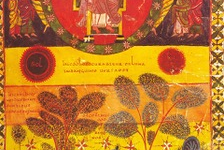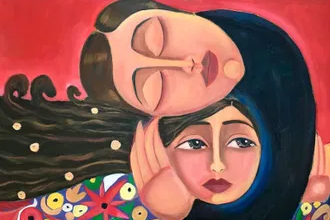Sunday Reflection with Fr Robin Gibbons - 18 February 2018
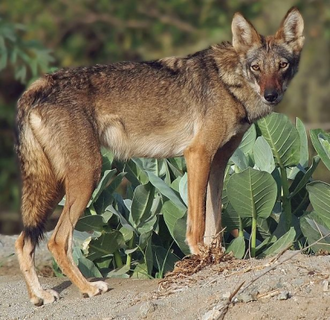
Arabian Wolf in Jordan, Wiki image by Ahmad Qarmish12
First Sunday of Lent
'At once the Spirit drove him out into the desert, and he remained in the desert for forty days, tempted by Satan. He was among wild beasts, and the angels ministered to him'. (Mk 1:12-13)
The simplicity of Mark's account of the temptation of Jesus in the desert gives us a different angle on the story. Gone are the dramatic encounters with Satan that we find in Luke and Matthew where Satan tempts Jesus three times, instead we have a simple story, nevertheless it has plenty to challenge us. One of the first things to notice is that it is the Spirit who drives Jesus out, as though this is his destiny and gift. Why? Well the s easy answer is to say that in the face of trial and temptation Jesus reveals his strength and purpose, he is the one who will prevail and win out over sin.
Yet I believe there is a hint of something more that concerns all of us. It's that perennial problem of sin and evil, the mystery of why things happen as they do. Here we face in a simple way the reality that our lives are not excused from that desert moment, nor of the encounter with sin, we too have to face the truth of who we are and in the temptations of life discover the ministration of our angels, that second image in this little tale, those beings who help, heal, forgive and nourish us. Jesus in this story is fed or sustained by these Angels during his time of trial, the Greek text suggests that they minister to him by service at table, a hint of the practical antidote to sin which is loving service of one another.
However there is a third image that haunts me a lot. It's the figure of Jesus amongst those wild beasts. If we go by the desert at the time of Jesus they could have been bear, panther, lion, hyena or wolf, hardly the easiest of creatures to tame quickly. Yet the juxtaposition of Jesus, Spirit and Satan seem to create a balance, the fulcrum of which is Christ himself. There he is, Satan tempts but does not overcome him, the Spirit broods and envelopes the Lord with his gift of perseverance, but those wild animals rest in a place of peace, in harmony with their creator. There is a hint of the paradise image in Genesis when livings things and humans are at peace in the garden of God or of Daniel in the Lions den or as the story of Noah reminds us of God's love for all living things not just humanity.
In our age of climate change, when we the most destructive species on the planet end the life of so many creatures even extinguish them, this Lent should be a time of reparation and restoration. It's never too late to save what little is left. For those we have annihilated, their memory can live on in the repentance of our actions to rebuild the desert. It is humbling to remind ourselves that we are not the inheritors of the earth. It is salutary to rediscover that God made the covenant with humans and living things: "I will recall the covenant I have madebetween me and you and all living beings" (Gen 9:15) and it is incumbent upon us to act as Christ did to live in peace and harmony with the all creatures, he who made the new covenant for the life of the world!
Lectio Divina
Extract from Archbishop Rowan Williams' Noah Lecture, Southwark Cathedral, 2009.
'I shan't labour the point that reading Genesis as if it licensed the exploitation of the rest of creation is a major mistake. Nothing could be clearer in the biblical text than the belief that humanity is meaningless seen independently of the world of diverse life-forms in which it is embedded. The flood story ends with the making of a covenant, a binding treaty, not just between God and humanity but between God and all living things (Gen.9. 8-17): God is committed to life, to the continuance of life on earth, and whatever happens he will not let life disappear. And although the focus in the story of the flood has been on animal life, it is clear that the horizon of the text extends much wider. The one thing we should not imagine is that God's covenant means that we have a blank cheque where the created world is concerned. The text points up that God's promise has immediate and specific implications about how we behave towards all living beings, human and non-human. It is not a recipe for complacency or passivity'.
From Bede's life of St Cuthbert
HOW CUTHBERT PASSED THE NIGHT IN THE SEA, PRAYING; AND WHEN HE WAS COME OUT, TWO ANIMALS OF THE SEA DID HIM REVERENCE; AND HOW THE BROTHER, WHO SAW THOSE THINGS, BEING IN FEAR, WAS ENCOURAGED BY CUTHBERT
Here also, as elsewhere, he would go forth, when others were asleep, and having spent the night in watchfulness return home at the hour of morning-prayer. Now one night, a brother of the monastery, seeing him go out alone followed him privately to see what he should do.
But he when he left the monastery, went down to the sea, which flows beneath, and going into it, until the water reached his neck and arms, spent the night in praising God. When the dawn of day approached, he came out of the water, and, falling on his knees, began to pray again. Whilst he was doing this, two quadrupeds, called otters, came up from the sea, and, lying down before him on the sand, breathed upon his feet, and wiped them with their hair after which, having received his blessing, they returned to their native element. Cuthbert himself returned home in time to join in the accustomed hymns with the other brethren.
Fr Robin Gibbons is an Eastern Rite Catholic Chaplain for the Melkites in the UK. He is also an Ecumenical Canon of Christ Church, Oxford.



